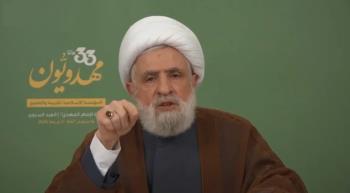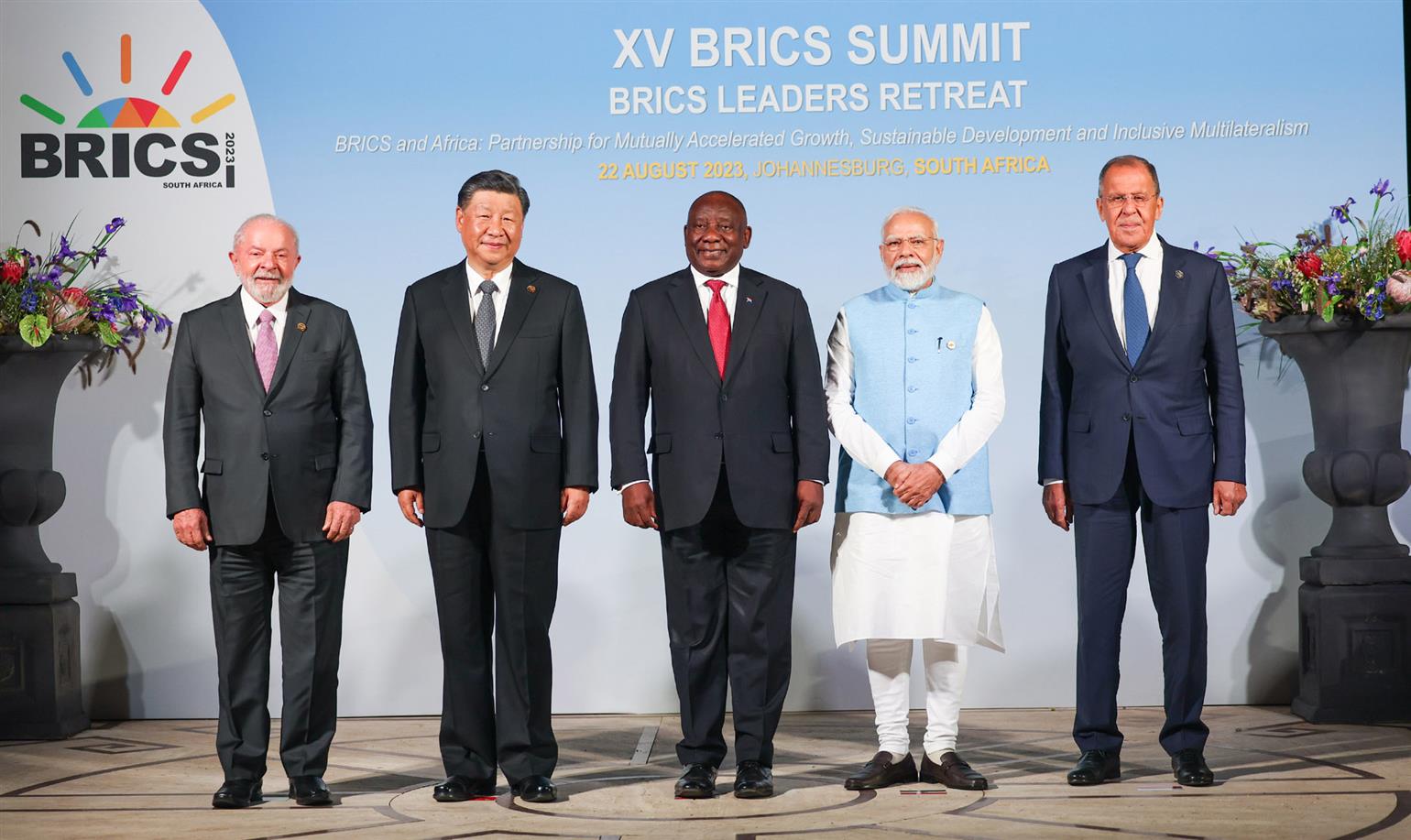Alwaght- In today's world, major international analysts talk about acceleration of the process of transfer of economic and political power hubs from the West to the East. Meanwhile, one of the heated matters of the nascent powers is the foundation of structures replacing the Western hegemonic structures in the international order like Bretton Woods Agreement and the institutions it created including World Bank and International Monetary Fund.
In such conditions, the BRICS economic bloc members have held their most important meeting this year to boost their economic cooperation in the future multipolar system.
The 15th BRICS meeting was held on Tuesday in the South African capital Johannesburg during which leaders of Brazil, India, China, and South Africa met.
South African President Cyril Ramaphosa in the three-day summit hosted China’s President Xi Jinping, India's Prime Minister Narendra Modi, Brazilian President Luiz Inacio Lula da Silva. Russian President Vladimir Putin joined the meeting via video conference.
In total, 34 African leaders and southern world joined BRICS leaders, as one of the main goals of this meeting is to establish partnership between the bloc and the other emerging economies.
This year's meeting is held under ‘BRICS and Africa, partnership for rapid growth, sustainable development and comprehensive multilateralism’ slogan, and for this reason, the West follows the news about it more sensitively.
BRICS agenda and goals
Although it has been 17 years since launching BRICS, no meeting has attracted global attention as much as this year's one.
Russian Foreign Minister Sergey Lavrov, who attended the summit on behalf of Putin, commented on the mechanisms of this economic bloc, saying that BRICS is ready to respond to the request of becoming one of the pillars of the new, polycentric and fair world order, and that is why this bloc has already started its expansion process. He added that one of the priorities of this group is to improve the capabilities of the New Development Bank (NDB), virtual currency reserve pool, the development of payment mechanisms, and increasing the role of national currencies in bilateral exchanges.
Accepting new members was also one of the top matters of discussion, and very likely in the next months a number of countries will be taken in as official new members.
It is noteworthy that more than 40 countries have expressed their desire to join the BRICS group, of which 20 countries have submitted an official request to join this bloc, and representatives from these countries were present at the South African meeting to discuss the structure of this organization to get more familiar with the structures of this progressive institution. The developing countries that have suffered from the Western colonialism are trying to stand by Russia and China in the new world order.
Focusing on promoting multilateralism and global governance, BRICS has become an attractive environment for other countries, and it is expected that with the success of this group, more countries will volunteer to join it in the future.
On the other hand, one of the heated topics for debate in this meeting is the joint currency to take on the US dollar hegemony. Given the volume of trade of the bloc, moving to joint currency as a replacement for the US dollar or local currencies will accelerate the process of the demise of the dollar dominance.
In recent years, especially after the war in Ukraine, de-dollarization has been on the agenda of the BRICS leaders and their allies, and measures have been taken in this regard, and it is expected that for the next decade, most of the exchanges between countries will be done with national currencies, which according to experts will take the pressure leverage off the US hands.
With its dollar dominance, the US has punished non-compliant countries for over eight decades, and the southern countries are discontented with this hegemonic practice and are seeking an alternative to get rid of this situation.
Since the establishment of BRICS in 2006, the member countries have adopted a spirit of openness, inclusiveness and win-win cooperation, and have continuously worked to expand the areas of cooperation and achieve fruitful cooperation results.
The foundation of BRICS, which these days is on its way to become the world's most powerful economic bloc, was an important step in increase of the role of the emerging powers in the global economic management. The leaders of the five countries agreed to increase the cooperation within the framework of the bloc to higher levels and expand the membership of this group. The BRICS countries are committed to creating a large family with joint interests, and this provides a broad platform for emerging economies to engage in inter-south cooperation and counter Western unilateralism at the international level.
South African President said: “The expanded BRICS will consist of countries with different political systems that share a desire for a more balanced world order.”
The South African envoy to BRICS said one of the reasons countries lining up for membership of the bloc is the currently “polarized world we are living in.” He added that the southern countries do not like being lectured about who they should support and how they should act or how they should manage their sovereign affairs. They are powerful enough and affirm each other's stances, he added.
Even such move as NDB foundation in 2015 was seen as a long jump by the bloc for building alternatives to the Western-dominated global economic institutions like World Bank and International Monetary Fund (IMF). With membership of Bangladesh, Egypt, and the UAE, the NDB members increased to 9 and it is expected to expand by membership of Saudi Arabia and Algeria.
BRICS, powerful rival to G7
The Chinese, which are preparing to become a top economic power in the upcoming decade, are seeking to strengthen the international organizations and mechanisms compliant with them. Beijing sees expansion of BRICS as best serving this agenda.
Ahead of the South Africa summit, China called for the BRICS to become a full-fledged competitor to the G7, a bloc of US-aligned economic powers. A Chinese official said, "If we expand BRICS to take the same share of the G7 in the world's GDP, this economic bloc will become more powerful in the world." The official stressed the commitment of the BRICS to defend multilateralism and work out reforms in the global governance system, and considered it an important platform for cooperation among developing countries. Wang Youming, senior research fellow at China Institute of International Studies (CIIS) says unlike G5, BRICS values mutual respect, understanding, equality, solidarity, openness, and consensus, and these are parts of the reason why many countries wants to join this bloc.
The Ministry of Foreign Affairs of China also announced that the BRICS seeks to support multilateralism and by increasing the representation of emerging countries, it is seriously working to reform the global governance system.
Although presently BRICS cannot compete with the G7, the members of this bloc are trying to introduce themselves as representatives of the southern countries and provide a fair alternative to G7. G7 consists of the most advanced economies in the world, the US, Canada, Germany, England, France, Italy and Japan, which was established in 1975 and has taken the economic pulse of the world in its hands. The members of the G7, which always put pressure on the developing countries with the lever of sanctions, have always been accused of ignoring the interests of a large part of the world's countries in designing global policies.
According to experts, many countries want to join BRICS because this bloc can help form an international mechanism fitting their economies and at the same time break the imbalance in the global governance system.
“BRICS acts as a defender of the interests of developing countries, and the goals and values of its members are consistent with the goals of most countries in the world,” said Valeria Gorbacheva, head of Multilateral Strategic Project Office at the School of Business at HSE University in Russia.
BRICS accounts for 23 percent of the global economy and holds one-fifths of the global trade and over 40 percent of the global population. The IMF predicts that the share of the BRICS in the global economy will increase to 40 percent in the next five years. If 40 other countries join BRICS in this period, half of the world's economy will be at its disposal and it will be influential in global decisions.
Though Beijing tries to make a serious rival to G7 with strengthening of BRICS infrastructure and upgrade the bloc’s weight against the Western-founded institutions, BRICS, just unlike G7, does not want to foist its will and demands on the world community. Lavrov maintained that the bloc is not seeking to transform into a new collective hegemony.
The experience of the US hegemony and the institutions under its dominance after the WWII have left an unpleasant mark in the memory of world public, and BRICS leaders do not want the same dominance for this fledgling bloc since Western policies have worked as a repulsion on the world stage, and so the BRICS members want to set a successful pattern of them among countries by creating attractiveness.



























